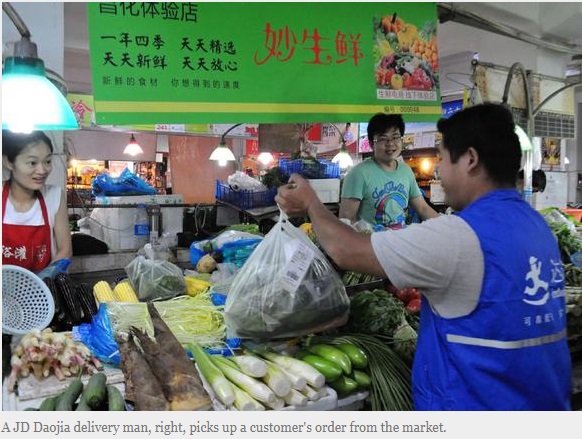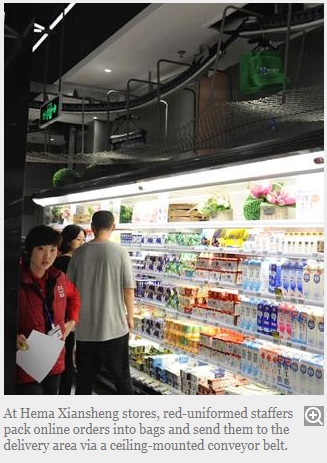
SHANGHAI/DALIAN, China -- Upstart Chinese grocery delivery services combining online ordering with bricks-and-mortar hubs are challenging the longstanding dominance of supermarkets, one of the last strongholds of conventional retail.
Online and offline
Shoppers throng a Hema Xiansheng supermarket in downtown Shanghai on a recent evening, browsing the orderly rows of fruits, vegetables, seafood and meats in search of ingredients for dinner. At first glance, it looks like an ordinary scene at an ordinary store.
The big difference is the red-uniformed staffers threading their way through the crowd, picking out products for online orders and packing them in insulated bags. The bags are hooked onto an overhead conveyor belt that whisks them away to a distribution area, where they are picked up by drivers who rush off on electric scooters to take them to customers. Hema offers free 30-minute home delivery to customers within 5km of a store.

E-commerce is at the heart of Hema's business model. The company's supermarkets double as warehouses and logistics hubs, along with serving as a kind of shop window to reassure consumers wary of subpar goods of the sort often found on the internet. They also draw people living nearby who have heard about Hema online.
"The fruits and vegetables are very fresh because they're delivered quickly," enthused a 25-year-old Shanghai woman who orders produce from Hema twice a week. "I hardly ever go to supermarkets anymore."
The company, which debuted in spring 2016, already operates 10 locations in Shanghai and opened its first in Beijing this year. It plans to expand into Shenzhen and Hangzhou soon.
Bringing the market to you
JD Daojia, an arm of major e-commerce player JD.com, lures consumers with eye-popping deals such as a carton of eggs or a bunch of bananas for 0.01 yuan -- less than a cent. The unit teams with the traditional markets found throughout China and with delivery company Dada to deliver orders within an hour.
When an order is placed, Daojia sends the details via smartphone to a store, which gathers the requested products, and to the driver tasked with delivery. Orders should be picked up from the market within 30 minutes and brought to the customer within the following half-hour. The roughly 4-yuan delivery fee is waived for orders above a certain amount.

